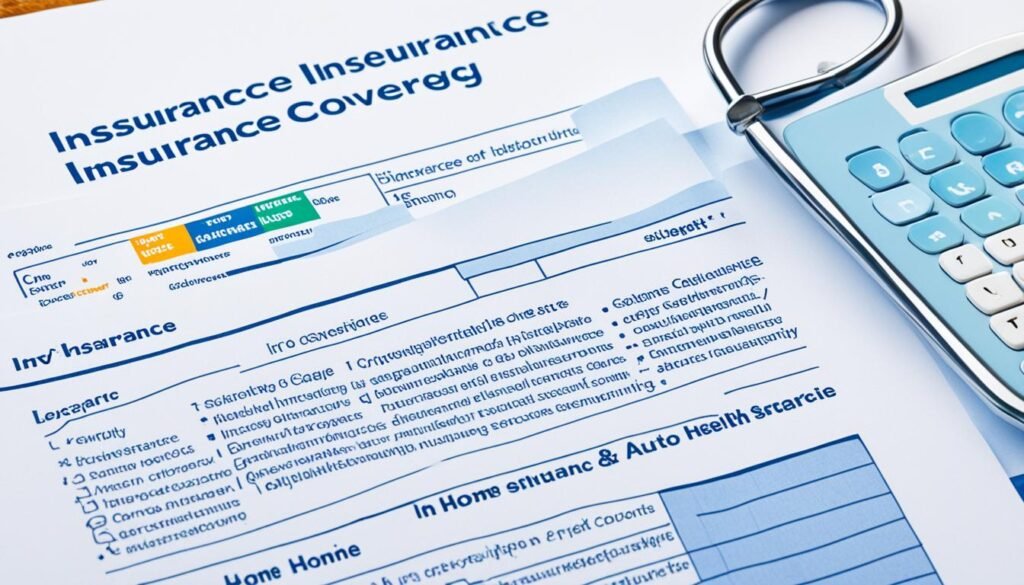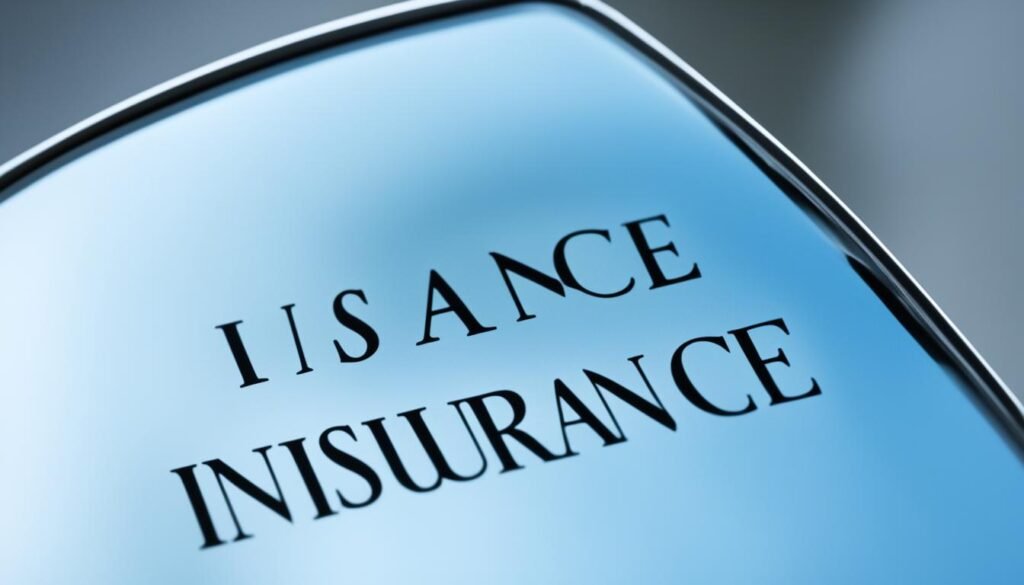Insurance is a key financial tool for protection against sudden risks and losses. It pools risks of many people and companies. This allows the insurance company to cover claims. By getting insurance, you protect yourself, your family, and your stuff from huge costs due to accidents, sickness, bad weather, and lawsuits.
Having insurance is vital for looking after risk. It gives peace of mind and security. With insurance, you won’t face big financial hits from unexpected events. It’s not just about car or health insurance; it includes house and life insurance too. The right insurance means you and your family are safe against life’s challenges.
Key Takeaways : Insurance Protect
- Insurance offers financial protection against sudden risks and losses.
- Pooling risks lets insurance companies handle covered claims.
- It reduces the financial worry of accidents, sickness, and more.
- Having the correct insurance gives you and your family security.
- Insurance is a crucial part of managing risks well.
Understanding Insurance Policies
An insurance policy is like a legal agreement between you and the insurance company. It lays out what each side should do. This means it keeps you safe from unexpected money troubles. To really get an insurance policy, you need to know about its core elements.
The Four Basic Parts of an Insurance Contract
- Declaration Page – This part shows who is insured, what items or risks are covered, the limits, and how long the policy lasts.
- Insuring Agreement – Here, the insurance company promises to pay for certain losses. This promise is your financial safety net.
- Exclusions – Exclusions are things the policy doesn’t cover. It’s key to know these so your policy fits your unique needs.
- Conditions – The conditions lay out what you must do for the policy to work. Following these rules keeps your policy valid.
Knowing the basics of an insurance policy is key to finding the right coverage. Understanding the declaration page, insuring agreement, exclusions, and conditions helps you choose wisely. This way, you get the most out of your insurance contract.
“Understanding the components of an insurance policy is crucial for ensuring the coverage meets your needs and protects you from unexpected financial losses.”
Also Read :What Are Asthma Symptoms?
Types of Insurance Coverage

The insurance world is vast, offering many ways to cover risks for both people and companies. Whether it’s for your car or your life, knowing about various insurances is key. It helps you pick the best coverage and stay protected. Let’s dive into the common types and what they offer.
Auto Insurance
Auto insurance takes care of costs from car accidents. It includes different kinds of protection. You get coverage for your car, help with bills if you hurt someone or damage their property, and support for medical bills.
Health Insurance
Health insurance is very important. It handles your medical bills, like check-ups, prescriptions, or hospital visits. Having it means fewer worries about surprise health costs.
Homeowners Insurance
Homeowners insurance safeguards your big investment – your home. It pays for repairs after fire, theft, or disasters. It also covers your lost items and can help if someone is hurt on your property.
Life Insurance
Life insurance protects your family financially after you’re gone. It gives a payout if something happens to you. This helps your family keep living as they did before.
Travel Insurance
Travel insurance is great for trips. It handles costs if your plans change, if your luggage gets lost, or if you get sick abroad. It offers peace of mind away from home.
There are many more kinds of insurance out there. Knowing what each can do helps you choose wisely. This way, you, your loved ones, and your things are all well-protected.
Also Read :What Are The Different Types Of Insurance?
Insurance Protect: Understanding What’s Covered

Understanding your insurance coverage is very important. It protects you from certain risks and events called “covered perils.” Within these, your insurer pays for any resulting losses. But remember, there are exceptions or events not covered by your policy.
So, it’s key to know what your policy includes and excludes. This means being aware of policy limits and your deductible. The limit is the most your insurer will pay. The deductible is what you pay first, out-of-pocket, before your insurer steps in.
- Insurance coverage: The specific risks and events that are covered by your policy.
- Covered perils: The situations in which the insurance company will pay for your losses.
- Exclusions: The events or circumstances that are not covered by your policy.
- Policy limits: The maximum amount the insurer will pay for a covered loss.
- Deductibles: The amount you must pay out-of-pocket before the insurer covers the rest.
Knowing the details of your insurance helps you protect what matters. Taking time to go over your policy gives peace of mind. It makes sure you’re properly covered against future risks.
“Reviewing the details of your policy can help ensure you have the appropriate coverage to protect against the risks you face.”
Also Read : How To Boost Your Credit Score For Better Loan Options
Car Insurance: A Financial Safeguard

The roads can be unpredictable, but car insurance is here to help. It acts as a financial safeguard. This auto insurance is there to protect us if we have an accident or something goes wrong.
What Car Insurance Covers
There are several key parts to car insurance. These include:
- Liability coverage – It helps pay for the damages or injuries you cause others. It’s often needed by law in most places.
- Collision coverage – This includes repair or replace your car after a crash.
- Comprehensive coverage – It guards your car from things like theft, vandalism, or natural disasters.
- Uninsured/underinsured motorist coverage – Cap protects you if the other driver has little or no insurance.
With these coverage types, you’re better able to handle the unexpected on the road. Have the right coverage and meet your state’s insurance needs. This way, you can drive with peace of mind, ready for whatever might come.
| Coverage Type | What It Covers |
|---|---|
| Liability | Damages or injuries you cause to others |
| Collision | Repair or replacement of your vehicle in a collision |
| Comprehensive | Non-collision-related incidents, such as theft or natural disasters |
| Uninsured/Underinsured Motorist | Protection if you’re involved in an accident with an uninsured or underinsured driver |
“Car insurance is a small price to pay for the peace of mind and financial protection it provides.”
Understanding car insurance helps you pick the right policy. You can make sure it fits your needs. This way, you’ll be ready for anything while driving.
Also Read : What Is Professional Liability Insurance?
Health Insurance: Covering Medical Costs

Health insurance protects you from big medical costs. It pays for both regular and urgent medical care. This includes visits to the doctor, time spent in the hospital, and the cost of medicine.
Your insurance helps with these expenses. You share the costs with your insurance company. This makes sure you can get the care needed for your health.
The deductible is an important part of health insurance. It’s the money you pay first before your insurance helps. After you meet the deductible, you’ll pay only part of the cost. Your insurance then covers the rest.
But, checkups, cancer checks, and shots are often free. This helps you take care of your health before you get sick. Catching health issues early can save you money on serious treatments later.
Having health insurance guards against big medical bills. It lets you afford the care necessary without debt. Knowing what your plan covers helps you make smart health choices.
Buying health insurance is smart for your money and health. Picking the right plan is crucial. It ensures you and your family are protected for any health need or emergency.
Also Read :Top Tips For Getting Your Loan Approved
Homeowners Insurance: Protecting Your Property

Homeowners insurance is vital for protecting your home, the biggest investment. It offers coverage for the home itself, your personal items, and liability. So in case of any unforeseen events, you’re not on your own.
What Homeowners Insurance Covers
It covers many risks that may harm your home or belongings. Here are the main points of most homeowners policies:
- Dwelling coverage: It takes care of your home’s structure, like the roof and walls, from dangers such as fire, theft, and natural events.
- Personal property coverage: This helps replace or fix your items if lost or damaged in a covered event. It includes everything from your clothes to electronics and furniture.
- Liability coverage: Covers legal fees and medical bills if someone gets hurt on your property or you’re found liable for damage elsewhere.
- Additional living expenses: It pays for temporary places to stay and other day-to-day costs if you can’t live in your home after a covered event.
Remember that some things, like floods and earthquakes, aren’t usually covered. These may need extra insurance. Knowing your policy well is key to keep your home and belongings safe.
| Coverage Type | Description |
|---|---|
| Dwelling Coverage | Protects the structure of your home, including the roof, walls, and foundation, from perils such as fire, theft, and natural disasters. |
| Personal Property Coverage | Covers the replacement or repair of your personal belongings, from furniture and electronics to clothing and valuables, in the event of a covered loss. |
| Liability Coverage | Provides coverage for medical expenses and legal fees if someone is injured on your property or you’re held legally responsible for damages. |
| Additional Living Expenses | Covers the cost of temporary housing and other living expenses if your home becomes uninhabitable due to a covered event, such as a fire or natural disaster. |
Having homeowners insurance is a must to protect your home, personal items, and wallet from risks. Knowing what your policy covers gives you peace of mind. So, you can enjoy your home worry-free.
Also Read : Why Do I Need Health Insurances?
Life Insurance: Providing Financial Security

Life insurance is really important for protecting your family’s future. It’s a deal between you and an insurance company. This deal pays your family if you die. This money can cover costs and keep your family secure.
There are two main kinds of life insurance: term life insurance and whole life insurance. Term life insurance looks after you for a certain time, like 10 or 20 years. But whole life insurance lasts your whole life. These policies give a death benefit to whoever you choose, like your family. This money helps with funeral costs, debts, and supports your family financially.
Buying life insurance means you’re putting your family first. The death benefit helps your family keep living as they’re used to, without financial worries. It can clear mortgages, loans, and pay for your kids’ schooling. This protection eases their grief, letting your family focus on healing and moving on.
“Life insurance is not just about protecting your loved ones financially; it’s about providing them with the reassurance that they won’t be alone in their time of need.”
Choosing the right life insurance makes sure your family will be okay, no matter what. It doesn’t matter if you get term life insurance or whole life insurance. What matters is the comfort it offers your family. They know they’re covered.
Travel Insurance: Safeguarding Your Trips

Heading out on a journey is exciting, whether for fun or work. But, sometimes, the unexpected shows up. That’s where travel insurance comes in to save the day. It helps cover the costs of things like canceled trips, medical surprises, and lost baggage.
What Travel Insurance Covers
With travel insurance, you can relax knowing you’re protected. Most plans offer helpful benefits like:
- Trip Cancellation and Interruption: Covers non-refundable costs if something major comes up, like an illness or family issue, and you can’t go on your trip.
- Emergency Medical Care and Evacuation: If you get sick or hurt while away, the insurance can pay for your medical help and even getting you home for treatment.
- Lost, Stolen, or Damaged Baggage: Protects the value of items that go missing or get damaged during your travels.
- Rental Car Coverage: Offers protection when you rent a car, so you’re not stuck with huge bills if something happens to it.
Remember, though, travel insurance might not cover some things. This includes cancellations because of bad weather or pandemics. It also might not pay for injuries from extreme sports. Always check what your policy covers so you know what to expect.
“Travel insurance is the best way to protect yourself from the unexpected and ensure your trip goes as smoothly as possible.”
| Coverage Type | Description |
|---|---|
| Trip Cancellation and Interruption | Reimbursement for non-refundable expenses if you need to cancel or cut your trip short due to unforeseen circumstances. |
| Emergency Medical Care and Evacuation | Coverage for the costs of treatment, hospitalization, and emergency transportation to a suitable medical facility. |
| Lost, Stolen, or Damaged Baggage | Reimbursement for the replacement of personal items that are lost, stolen, or damaged during your trip. |
| Rental Car Coverage | Protection from financial liability in the event of an accident or damage to the rental vehicle. |
Importance of Insurance in Risk Management

Insurance is key in keeping risks under control. It shifts the financial dangers from unexpected events to insurance companies. This way, you, your family, and your assets are safe from big losses caused by accidents, health issues, natural disasters, and liability lawsuits.
Without it, you’d have to pay the full costs yourself. This could cause major financial problems. Adding insurance to your risk management plan is crucial. It protects your financial health in the long run.
Insurance is vital for securing your financial future. It lets you hand over the money worries of unexpected events to the insurance company. This keeps you focused on daily life, knowing you have a backup to handle possible losses.
Getting the right insurance policies brings calm and financial safety from many risks. Whether it’s a car crash, health emergency, or natural calamity, insurance offers the financial certainty needed to face hard times and maintain your financial health.
In times of unexpected events, insurance makes the difference between going broke and bouncing back. By including insurance in your risk management, your assets get protection. This keeps you and your family safe from the financial downsides of surprises.
| Type of Insurance | Key Benefits |
|---|---|
| Car Insurance | Covers liability, property damage, and medical expenses in the event of an accident. |
| Homeowners Insurance | Protects your home and personal belongings from damage or theft. |
| Health Insurance | Covers the cost of medical treatment, including hospitalizations, doctor visits, and prescription medications. |
| Life Insurance | Provides financial protection for your loved ones in the event of your death. |
| Travel Insurance | Covers expenses related to trip cancellations, delays, medical emergencies, and lost or stolen belongings while traveling. |
Understanding insurance’s role in risk management helps you act to secure your financial future. It protects you and your loved ones from the effects of unexpected events.
“Insurance is not just a way to protect your assets, but also a means of safeguarding your financial future and providing peace of mind.”
Choosing the Right Insurance Coverage

Selecting the right insurance is crucial for you and your loved ones’ safety. It might seem hard, but with a few simple steps, you can get the best coverage without spending too much.
Factors to Consider
First, figure out what you need. Think about the risks, like home damage or medical emergencies. Confirm what coverages and costs work with your budget.
Next, look at what you can spend. Find out how much you can pay for insurance. This will help you choose the best protection that doesn’t stretch your wallet too thin.
It’s also key to check the insurer’s background and if they can pay claims. Look into the company’s customer service, how they handle claims, and their financial health. This way, you’ll know they’ll support you when something goes wrong.
Don’t forget to look for any ways to save or get specific coverages you might need. Companies often give deals for combining policies or having a safe driving record. Using these can make your policy better and more affordable.
| Factors to Consider | Explanation |
|---|---|
| Risk Assessment | Evaluate your potential risks and exposures to determine the appropriate policy limits and deductibles. |
| Budget | Review your financial situation and set a realistic budget for insurance premiums. |
| Provider Reputation | Research the insurer’s track record of customer satisfaction, claims processing, and financial stability. |
| Discounts and Specialized Coverage | Explore available discounts and specialized coverage options that may fit your unique needs. |
By weighing these factors, you can find a plan that’s both protective and affordable. Investing time in choosing the best policy will give you the security and peace of mind you need.
Also Read : Discover Subsidized Loans Affordable Financing Options
Conclusion
Insurance is crucial, protecting people and their stuff when bad things happen. You need to know about different policies, like car and life insurance. This knowledge helps you make a plan that fits your life perfectly.
The right insurance brings peace of mind and financial security. It keeps you ready for any surprise, like a medical issue or home problem. With insurance, you are taking big steps for your family’s future.
Adding insurance to your money plan cuts down on big risks. It keeps your belongings and savings safe. So, you can enjoy life without worrying too much about what might go wrong.
FAQs
What is insurance and how does it work?
Insurance is like a safety net that guards against sudden risks and losses. It combines the risk of many people and businesses. This way, when a claim is made, the insurance company can cover it.
What are the four basic parts of an insurance contract?
The main parts of an insurance contract are: 1) Declaration Page, 2) Insuring Agreement, 3) Exclusions, and 4) Conditions.
What are some common types of insurance coverage?
Common types of insurance include auto, health, home, life, and travel insurance.
What are “covered perils” and “exclusions” in an insurance policy?
Covered perils are situations where the insurance company pays you. Exclusions are events not covered by the policy.
What does car insurance cover?
Car insurance covers liability, collision, and comprehensive needs. It also handles medical expenses and protects against underinsured drivers.
What does health insurance cover?
Health insurance pays for both regular and urgent medical costs, including doctor visits and prescription medicines. You might have to pay some costs, like deductibles and copays.
What does homeowners insurance cover?
This insurance protects your home, belongings, and other structures. It accounts for fire, theft, and some natural events. It also covers liability and extra living costs.
What does life insurance cover?
Life insurance provides money to your family if you pass away. This money goes to the people you choose as beneficiaries.
What does travel insurance cover?
Travel insurance includes help for trip cancellations, delays, medical emergencies, and lost bags. It can save you money when things go wrong.
Why is insurance important for risk management?
Insurance is key for handling risks without a heavy financial hit. It helps shield you, your family, and your property against big losses.
What factors should I consider when choosing insurance coverage?
Think about what you really need and can afford in insurance. Also, check the company’s trustworthiness and stability. Look for any special deals or coverages too.
Source Links
- https://www.doi.sc.gov/957/Understanding-Your-Insurance-Policy
- https://www.investopedia.com/terms/i/insurance.asp
- https://www.progressive.com/answers/auto-101/




